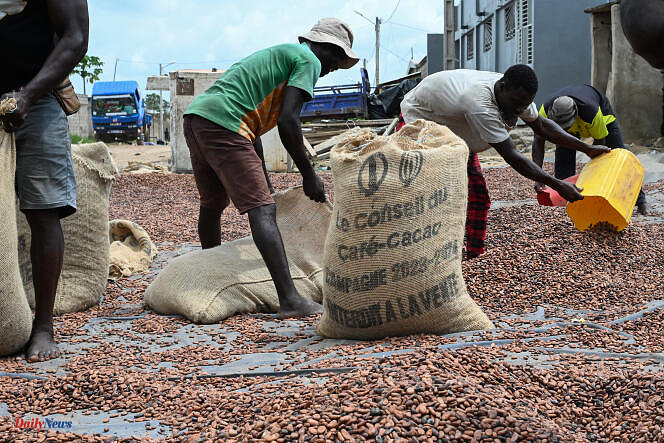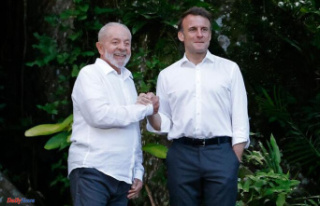Anger is growing in the cocoa plantations of Ivory Coast. The surge in brown gold prices, driven by a lower supply than expected due to heavy rainfall, does not benefit farmers in the leading producing country. While the selling price of a kilo of beans reaches 5,100 CFA francs (nearly 8 euros) in Cameroon, Ivory Coast, which supplies 45% of world cocoa production, it is around 1,000 CFA francs. The first link in the production chain, the planter is also the least well paid actor in the sector. Regulation requires.
To protest against this gap between the prices set by the Ivorian authorities and prices on the free market – a tonne of cocoa exceeded $10,000 in New York on Tuesday March 26 – two unions of Ivorian farmers filed a strike notice unlimited from March 28 to disrupt the end of the main harvest season, which closes on March 31, and the start of the intermediate season, scheduled for April to the end of September. The National Agricultural Union for Progress in Côte d'Ivoire (Synapci) and the National Association of Producers of Côte d'Ivoire (Anaproci) are also demanding the resignation of the director of the Coffee-Cocoa Council (CCC).
The body responsible for regulating the cocoa sector has drawn the wrath of growers for having sharply criticized, in a note published in mid-March, the “overpayment” of cocoa at the entrance to the factories. In its sights, exporters and intermediaries who buy beans above the maximum price before export, set at 1,080 CFA per kilo. Offenders, the body warned, face “a 10% penalty” and “withdrawal of [their] approval in the event of a repeat offense”. Objective: avoid overbidding and protect against unfair competition small exporters who do not have the means to obtain beans above the capped price.
“Inconsistency” of the sales system
According to the body, the guaranteed floor price for producers of 1,000 CFA francs protects growers from speculation while giving visibility to local cocoa processors, which is supposed to encourage the production of chocolate made in Côte d'Ivoire. But for Kanga Koffi, head of Anaproci, this regulation especially disadvantages growers: “On the one hand, we set a minimum purchase price for the planter and, on the other hand, we establish a maximum price of purchase for the exporter. This last rule does not allow planters to claim more than 1,000 CFA francs. »
This “inconsistency” of the sales system is also denounced by the president of Synapci, Moussa Koné. According to him, the CCC, by urging exporters to respect the purchase price at the factory gate, “pushes intermediaries to negotiate per kilo of beans with growers at an amount often lower than the floor price”. Buying from the farmer the kilo below the regulated price is theoretically prohibited, but "in fact, no sanction is applied to the buyer and the injured planter does not benefit from any compensation mechanism", maintains the trade unionist. If the intermediaries are, on the contrary, ready to pay a more attractive price, around 1,200 CFA francs, to ensure they obtain the precious brown beans, the planters gain.
But these increases are incompatible with the Ivorian advance sales system where the purchase price of cocoa is fixed before each harvest campaign. A strategy protected by the decree of October 17, 2012 and designed to protect cocoa farmers from the vagaries of the global market. “If current prices were falling, producers' incomes would have been guaranteed and they would not suffer the drop,” says the CCC. According to the body, growers will benefit from the rise in prices on the world market “staggered from the next campaign”.
“Côte d’Ivoire is imprisoning itself”
The problem: the multiplication of heavy rain phenomena, caused by climate change, is causing a reduction in the number of beans produced in Côte d'Ivoire and complicating volume estimates from one campaign to another. However, it is on the basis of these estimates that Ivorian cocoa is sold on the world market before the start of the harvest season. The minimum price guaranteed to farmers is also fixed upstream.
With 80% of its beans marketed six to twelve months before their harvest, the country cannot raise its prices to match the soaring price. Thus, the farmgate purchase prices – cocoa purchased directly from the planter – of the 20% of the remaining volume, put on sale during the harvest, remain relatively close to the floor price throughout the campaign. “Côte d'Ivoire is imprisoning itself by depriving producers of benefiting from the rise in prices,” laments economist François Ruf, who has long worked for the Center for International Cooperation in Agricultural Research for Development (CIRAD ).
For Anaproci and Synapci, Ivorian producers should be able to benefit from protection against market price volatility as well as more significant economic benefits when the price of cocoa increases. They thus demand an “assessment of the system” and a “re-examination” of the 2012 decree which would allow more flexibility on the conditions of sale. For example, a mechanism for occasional revaluation of the purchase price of a kilo of beans when the price of cocoa reaches a peak.
The management of the Café-Cacao Council maintains that it has not received a request for a hearing from these two unions. If no alternative to the current sales system is on the agenda, she specifies that a consultation framework already exists with “representatives of serious producer organizations”. Anaproci and Synapci, which claim to represent nearly 1.4 million coffee and cocoa producers, say they are ready to mobilize their members in order to accelerate this consultation and obtain better income for planters.












